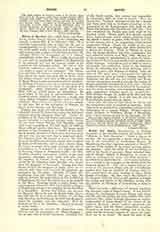

Bruno the Saxon (SAXONICUS), a German chronicler of the eleventh century and author of the “Historia de Bello Saxonico”. Little is known of his life. He was apparently a Saxon monk belonging to the household of Archbishop Werner, of Magdeburg, who was a vigorous opponent of Henry IV and one of the leaders of the Saxon uprising against the emperor. After the death of the archbishop in 1078 at the hands of peasants, Bruno attached himself to Werner, Bishop of Merseburg, to whom, in 1082, he dedicated the work, “De Bello Saxonico”, by which he is chiefly known. As its name indicates, it is a record of the struggles of the Saxons with the Emperor Henry IV. The author begins with an account of the youth of Henry and the evil influence exerted over him by Adalbert of Bremen after he had passed from the stern tutelage of Anno, Archbishop of Cologne. He then traces the relations of the emperor with the Saxons and narrates at length the causes and events of the rebellion, ending with the election of Hermann of Luxemburg as king in 1081.
There has been a difference of opinion regarding the historical value of Bruno’s work. It was written during the contentions between Henry and Gregory VII, and the author has been classed with those partisans who, either through ignorance or malice, endeavored to lower Henry in the esteem of his subjects (Stenzel). Bruno indeed supported the pope’s cause, and his Saxon sympathies manifest themselves at times in his writings, but of his sincerity and is expressed purpose to narrate the truth there can be no doubt. He made the Most of his sources of information and, in spite of occasional omissions, gives a vivid picture of the times from the point of view of an interested contemporary. The letters of the Saxon bishops and other original documents which he includes in his history give an added value to the work. The text of the “De Bello Saxonico” is given in the “Monum. Germ. Hist.” (Pertz, Hanover, 1848), V, 327-384. A German translation, with an introduction, was published by W. Wattenbach (Berlin, 1853). For an extended, though not unbiased, history of the time, cf. Stenzel, “Geschichte Deutschlands unter den frankischen Kaisern” (Leipzig, 1827).
HENRY M. BROCK

